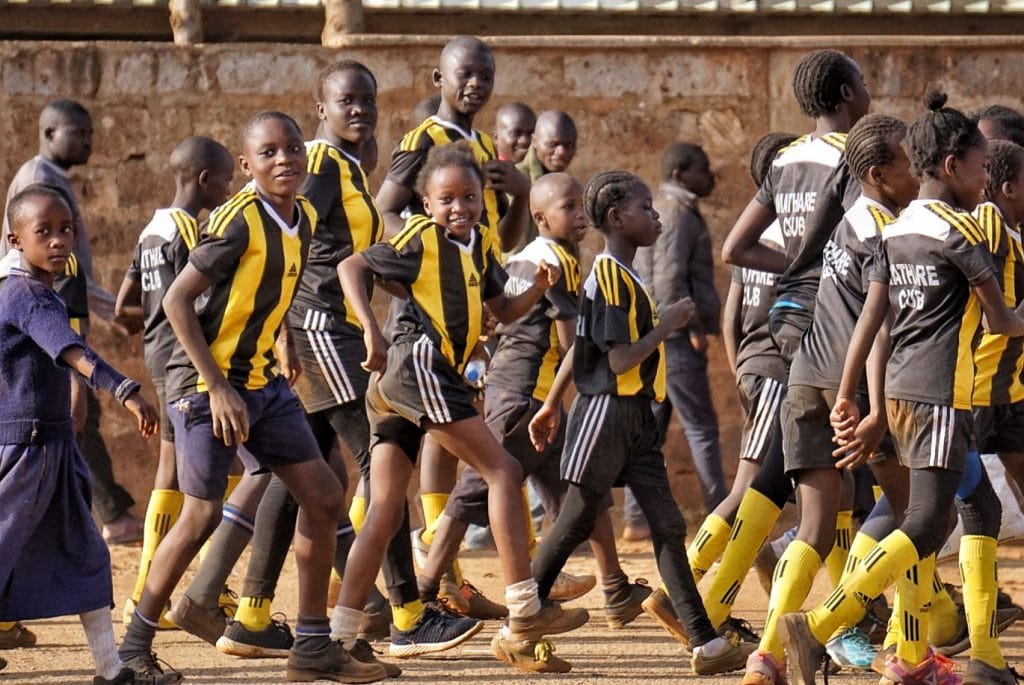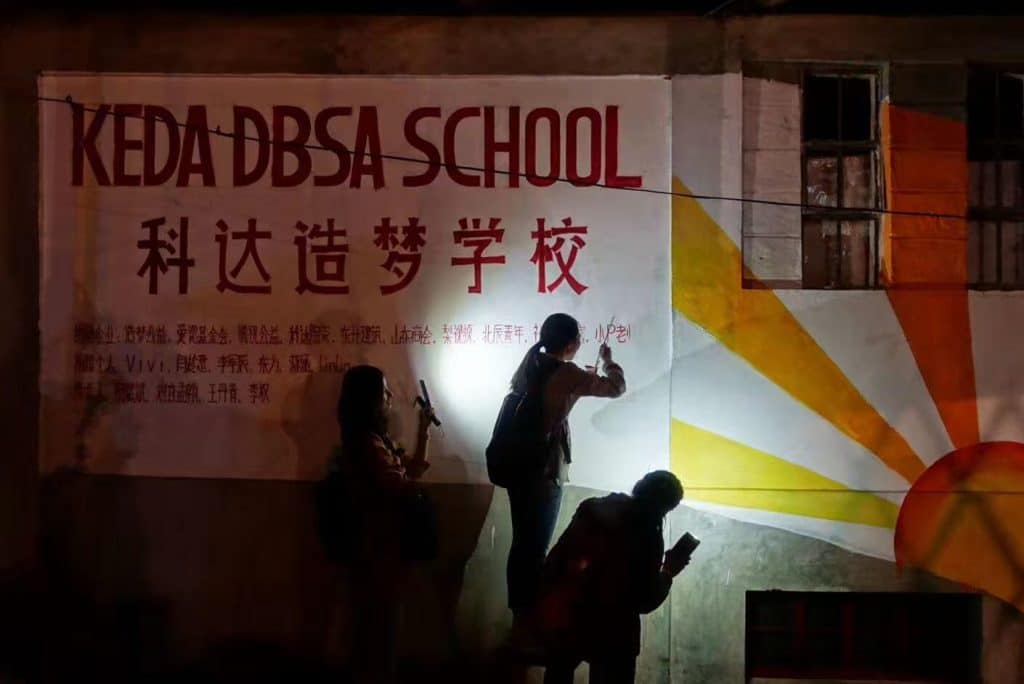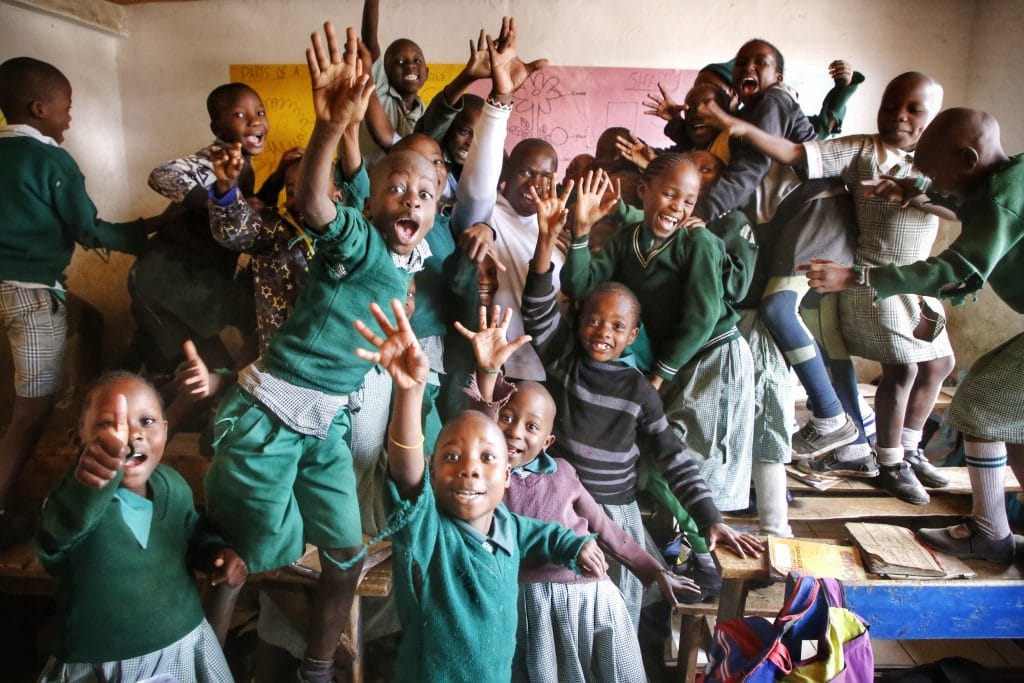Since the establishment of the Forum on China-Africa Cooperation in the early 2000s, China-Africa relations have been widely discussed and come under close scrutiny. Investment is flowing and trade between China and African countries has been increasing annually. There is an estimated million Chinese residing in Africa and approximately 200,000 Africans in China. Although communication and interactions are frequently reported between China and African countries at the governmental level, they are less often seen on a personal or community level.
There is however a small number of NGOs from China that are operating aid and humanitarian programmes in Africa, in alignment with the UN’s SDGs. The Dream Building Service Association (DBSA) is one such example. The organisation has been working hard to promote youth empowerment in vulnerable areas in countries such as Kenya and Uganda since 2015. The idea of the DBSA emerged when the initial five founders met in Mathare, Kenya, during one of their volunteer experiences. Since then, through running programmes on poverty reduction, resources mobilisation and network building for young people, the DBSA’s mission has come to life. CDB is delighted to have the opportunity to interview the General Secretary of DBSA, Pan Yanwen, who was a volunteer and later became a full-time staff of the organisation in 2019, and invite her to share her own experiences and reflections on working in Africa for a grassroots Chinese NGO.
With years of experience of studying in Australia, South Korea and Japan, Yanwen’s initial plan was to become a theatre playwright. She admits she loved doing all kinds of volunteer work in her spare time after her studies, because they helped her to learn more about a country and to be included in the local culture, community and society. Yanwen’s expected path in the world of art and literature started to shift when she first encountered DBSA. In her final year, Yanwen learned about an opportunity offered by DBSA to work in Kenya for a Talent Show programme with kids living in ghettos, and she was very keen on the idea. “Joining the programme seemed like a rather natural thing for me,” Yanwen says, “I went to Africa not because it was always a plan in my mind, and not because I thought Africa was the neediest continent in the world. Studying abroad gave me the chance to see many different cultures, to understand and appreciate them with as little bias as possible. It also taught me to be open-minded about my life and take any opportunity when it comes.”

The Talent Show programme in Kenya was a great success, with all its targets fulfilled. In addition, Yanwen clearly felt the desire and need of the children to be more frequently involved in programmes like this. In January 2019, she decided to work for DBSA full-time and continue doing what she describes as “work whose primary goal is to solve social problems and which has great social value”.
“Working for an NGO as a member of staff is substantially different from working as a volunteer”, Yanwen explains. “As a volunteer, you can only focus on the small part you play in a team or a project and motivate yourself through sheer zeal and passion. But working as staff requires you to rationally analyse all relevant factors, making sure that each party’s interests are well balanced, considered and protected.” It is not an easy task, and for the staff of NGOs in China, the work has been made even harder because resources are scarce in many circumstances.
Yanwen officially joined DBSA on 1st January 2019 and was sent to Uganda for the Binance Lunch for Children project in less than two weeks. The challenges were enormous for a young woman who had a vision and ambition to help the vulnerable in Africa but had little knowledge about Uganda, nor sufficient training to prepare her for more practical work there. She was having to recruit local staff in Uganda, make purchasing plans, draft contracts for the parties involved and communicate with the schools that were going to be supported by DBSA almost entirely on her own within two weeks of arriving.
When asked why this was the case, Yanwen reveals the common issue that many Chinese grassroots organisations face – a lack of resources and workers. The DBSA has collaborated with a number of foundations in China in their previous programmes in Africa, but more partnerships need to be formed both in China and abroad, so the organisation can continue to operate. But Yanwen also points out that the reasons behind the insufficient number of workers lay partly in how people working in the non-profit organisations are misrepresented in the media.
Yanwen has noticed a clear trend in media reports when discussing people who commit themselves to the non-profit sector. “A lot of news’ and articles’ titles include talk of a ‘graduate from Oxford University’ deciding to go to Africa for development work, or someone ‘giving up a high-income job in an investment bank’ to work for the non-profit sector. I think headlines like these have created a false impression about non-profit work in the public. Am I not eligible to do non-profit development-related work if I am not a graduate from a prestigious university or I did not previously work in a lucrative industry? Non-profit work should not be labelled as privileged people giving up their benefits to save the poor, or people making an extraordinary choice compared to their peers. Non-profit work should be available for everybody who is passionate about it, and it should not be regarded as an unusual career path.”
One particular challenge in Uganda which Yanwen mentions was to persuade the local people that this programme would not be harmful to them. The Binance Lunch for Children project adopted blockchain technology and cryptocurrencies, which at first were seen with suspicion by the locals. Yanwen firmly believes that communication with local partners and people is the key to removing doubt, confusion and sometimes even rejection. Since the Belt and Road initiative was announced by the Chinese government in 2013, cooperation and partnerships between China and Africa have frequently taken place, yet they have mostly been at the national level.
For immigrants from China living in African countries, engagement with local communities is unfortunately little. “When a local community in African receives our programmes, they are normally very cautious because they think our programmes will put them at a disadvantage. This cautious attitude is understandable, but it has become a huge obstacle for our programmes being entirely accepted by the local people.” Yanwen acknowledges that this is something that cannot be fundamentally changed by a grassroots NGO and its programmes: “It is something that I hope can be gradually resolved with mutual efforts from both sides. On our side, I look forward to seeing more Chinese organisations reaching out to African people and local organisations, and promoting more communication, engagement and collaboration at an individual level. That is what the DBSA has been working hard on – to establish a brand for NGOs from China working overseas”, she adds.
However, doubts do not only come from the host country; voices from the homeland also show misunderstanding and mistrust. “Many question me when they learn I am doing School Lunch and School Construction programmes in Africa, because in their mind a lot of poor villages in China still need school buildings and free food to achieve equality in education”, says Yanwen, “but what people have not realised is that the situation in Chinese rural education has changed drastically over the years and it is not what they imagine anymore. The majority of schools in rural villages have good facilities and food is no longer a vital factor that attracts students to attend school. But in some African countries, the situation is very different.”
She explains the reality of areas in Uganda through the details she saw in the country: “when I first visited a school for our School Construction programme, I did not even realise I was in a school. The teaching building only had an iron roof supported by a few wooden sticks. So every time it rained, the headmaster would shout to the students ‘Run! Run to the baby class (the nursery, and the only room made of bricks)!’ The building was also in danger of being burned down when the heat got too intense, and I actually saw some other iron sheet houses burning down. If that happened, students would inevitably lose their school”.
She continues: “speaking of school lunches, in places where we carried out our programme, there were students who came to school because of the free meal, otherwise they would starve at home. And since the lunch project was launched, we saw an obvious rise in local school’s attendance rates, which is beneficial to children both in the present and the future. We were really working to help a group of children who were in a different state compared to their counterparts in China, and who were in urgent need.”

“Understanding should definitely be established to bridge the gaps between people’s imagination of Africa and the reality. Our imagination is limited, especially on things or places we know very little of. Understanding is not only needed for people at home to consider our work, but also for people who are already living and working in Africa”, Yanwen emphasises. Now that the government is intent on facilitating infrastructure building in African countries, investment and labour from China have been following the government’s policy. “I have encountered a Chinese construction team when I was coordinating another programme by DBSA on school construction in Uganda. Effective communication was difficult to achieve between the school and the construction team, and I have to say that I think biases and prejudices held by the Chinese workers against the local people hindered it. This in fact slowed down the whole process and from a business’s perspective it was not the wisest strategy to adopt. A lot of effort, time and money could have been saved if those biases and prejudices did not exist or were removed, with a willingness from the Chinese team to listen to staff in the school and try thinking in their shoes.”
“I believe two of the things that the DBSA has done well is listening to our local staff’s opinions and thinking from their perspectives, which displays our respect to them. Three of our local staff in Uganda once talked about this with me. Before they worked for us, they worried that we would be harsh to them, as they had seen in other companies in real life or heard from the news reports. But what they saw in us was the opposite, and they felt they were respected and fairly treated. This story actually shows that the reputation of us as Chinese in Africa is hugely influenced by two factors: firstly, our own behaviour, and secondly, the media. Certainly, local people might be misled by some media reports which include certain biases, yet our own media reports at home, in many circumstances, also only reflect part of the story about Africa, focusing mostly on diseases, hunger, war and political instability. That has led many of us to think that because of the underdevelopment that many African countries face, people there must also be primitive and less ‘advanced’ than us. But that is wrong.
Our behaviour is a revelation of our belief and attitudes, which can easily be conveyed to others. If used properly, it can become a kind of soft power to attract people to collaborate with us, but if used improperly, it will inevitably affect our reputation as Chinese and collaborations between us and our potential partners.” One effective way that Yanwen trusts can help to diminish biases and build bridges is for Chinese people who have been to Africa to make their voice heard. “People who have experience of Africa should reveal the untold side of the continent, sharing more truths about its culture, history, people and customs, and allow the public to hear their voice.”
Going from being a passionate volunteer to a determined member of staff working in African countries with DBSA, Yanwen claims that she has matured in a lot of aspects and has many times been deeply touched by the local people who she has worked with. “In the first few weeks in Uganda, I rarely slept because the workload was utterly overwhelming. But once I finished and the project produced satisfactory results, I was proud of myself and believed this experience had equipped me with skills that would enable me to overcome many other challenges in future programmes.”
When asked what touched her the most while working in Africa, Yanwen takes a little while to go through the stored-up memories of her work in Africa, and then says, “it is the spirit of supporting each other. In our culture, many times we hold the notion that when resources are scarce, we should first take care of ourselves and our family, and if we still have spare energy and resources, then we help others. However, in Kenya and Uganda, I saw a spirit opposed to the one I just mentioned: a young adult’s sacrificial giving to children who could not afford to buy clothes for their dance performance, the owner of a shabby little hotel supporting his relatives’ kids to go to school when he could barely make ends meet, and so on! That is something that surprises and moves me every time I think about it, something that genuinely reflects the value of humanitarianism and mutual development.”
Yanwen is eager to see more Chinese go out and work to promote the human welfare of people in other countries, if that is their vision and ambition. As a person who has had this experience, Yanwen has two kind suggestions to give. “Although they may sound like cliché, but being open-minded and willing to listen, understand and respect is of utmost importance when you go to work with the aim of achieving development, in a place of which you do not have full knowledge. News and reports from the media can be helpful, but remember that our perceptions derived from what we see and hear in the news are in fact not comprehensive.
We should leave some space in our minds and wait for it to be filled by our own experiences, when we are physically present in that very place, and be open to accept and respect things that are different from what we are used to. Everyone deserves to be listened to, understood and respected, and in order to make it happen, we have to keep an open mind. Poor or rich, educated or illiterate, man or woman, young or old, we are all human beings and should be treated with equal compassion and respect. That should be the core and basis of any work aimed at promoting and achieving development.”




